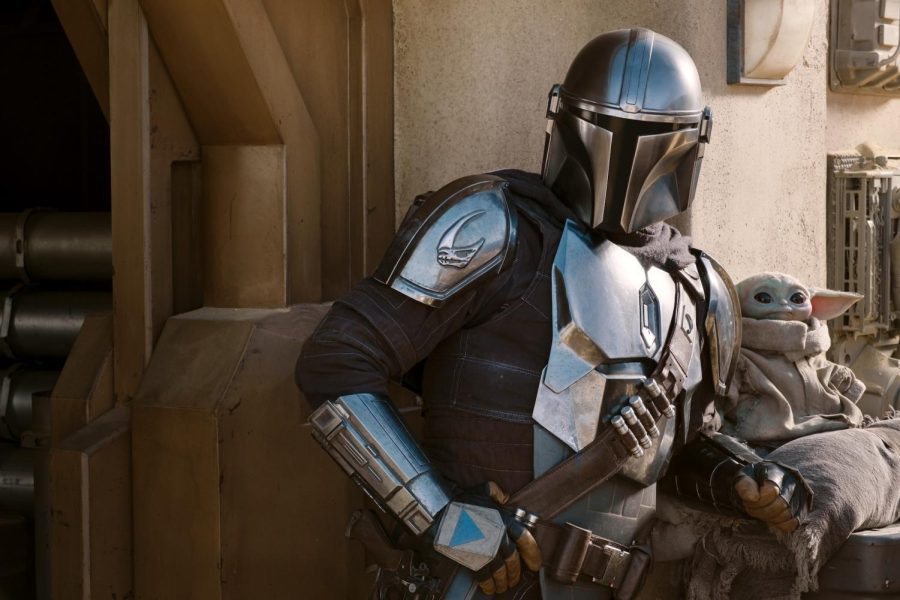Opinion | ‘Star Wars’ is not meant for Disney+
Actor Pedro Pascal stars as the Mandalorian in popular Disney+ show “The Mandalorian” in 2019. Assistant opinions editor, Talia Duffy, believes that the Star Wars franchise is best suited for films instead of exclusive Disney+ content.
August 8, 2022
The following contains spoilers for the Disney+ Star Wars series including “The Book of Boba Fett,” “Obi-Wan Kenobi” and “The Mandalorian.”
I’m finally getting around to the end of “The Book of Boba Fett,” one of the new “Star Wars” series available exclusively on Disney+. I know I’m several months behind, but it’s been difficult to carve out time in my schedule for television.
Or maybe I just wasn’t motivated enough to watch it.
“The Book of Boba Fett” is good enough; like many fans, I enjoyed the show and watched it through to the end. The other Disney+ series, “The Mandalorian” and “Obi-Wan Kenobi,” are stronger additions to the franchise. However, the absence of new “Star Wars” films is noticeable; the gap remains unfulfilled.
The glaring weaknesses of the “Star Wars” Disney+ series leave the viewer wondering what could have been if these stories were adopted as films instead. While it might work with the Marvel Cinematic Universe, Disney’s new streaming-reliant business model does not fit the galaxy far, far away. “Star Wars” is meant for the big screen.
Get The Daily Illini in your inbox!
Long a subject of fan obsession, Fett’s cameo appearance in “The Mandalorian” rekindled hopes for a spinoff centered around the legendary bounty hunter. In the era of “Rogue One” and “Solo,” this would have been a movie. Instead, it was seven episodes of a thin story padded with filler and far too many shots of characters strolling melodramatically across the deserts of Tatooine.
Once a compelling subplot about a Tusken Raider tribe adopting Fett as one of their own ends in tragedy, the narrative loses steam. The last three episodes practically abandon Fett, instead becoming season 2.5 of “The Mandalorian.”
“Obi-Wan Kenobi” faced similar problems. While many of its episodes felt like a true “Star Wars” project, some content seemed trivial — almost as if it was added in just to create more episodes.
Apparently, that’s exactly what happened. “Obi-Wan Kenobi” was originally supposed to be a movie trilogy, but after “Solo: A Star Wars Story” lost money at the box office, all spinoff films were canceled. According to screenwriter Stuart Beattie, the script for the first scrapped Kenobi film was reworked and expanded to become the six-hour “Obi-Wan Kenobi” series.
There’s a reason these shows work so well with Marvel but miss the mark with Star Wars. The franchises, despite now being owned by the same parent company, are fundamentally different.
Marvel has always been expansive, each movie a moving piece in an anthology-style narrative. The characters drive the story, so it makes sense for each film to focus on one or two or 20 heroes and their fight against a villain. Marvel does spectacle and does it well. All these aspects are easily translated into a television format.
In “Star Wars,” the story is driven by the story itself: the balance between good and evil, the politics of galactic power, and the history of species, religions and orders. Yes, there are main characters in each film, but they cannot support the narrative on their own. “Star Wars” has moments of spectacle, but too much of it feels tacky and foreign — especially compared to the earnestness of the original films from the 1970s and ’80s.
The creators of the Disney+ series are attempting to cooperate with these truths; “The Mandalorian” and “The Book of Boba Fett” — and potentially the coming “Ahsoka” show — revolve around a central storyline and feature many of the same characters. However, the result is disjointed and — dare I say — sometimes feels like a ploy to entrap subscribers to the new streaming service.
The tales “Star Wars” wants to tell would be sharper, cleaner and more impactful in a two or three-hour cinematic experience.
Of course, “Star Wars” has succeeded with television before. “Star Wars: The Clone Wars” and “Star Wars: Rebels” — animated shows with several seasons of 20-minute episodes — were commercially and critically successful. Each can be enjoyed independently. They aren’t packed with filler, because they’re not trying to differentiate themselves from other shows that follow the same story under a different name.
And unlike the new live-action, limited-series Disney+ content, they were never meant to replace “Star Wars” movies. The story of Grogu and the Mandalorian has great potential — and that potential would have been maximized as a compact film trilogy.
“Star Wars” must refocus. “Star Wars” is not a tool to promote Disney’s business ventures. “Star Wars” needs to get back in theaters.
Talia is a sophomore in Media.







